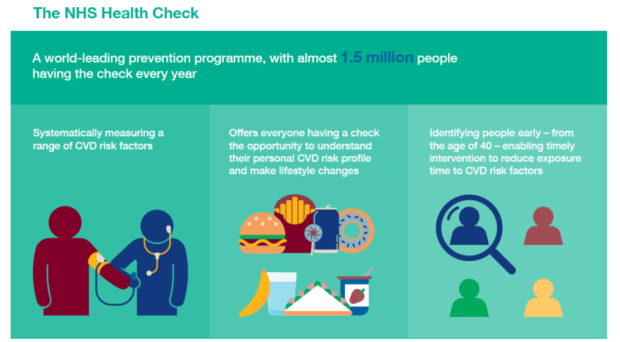
Cardiovascular disease (CVD) is the number 1 cause of death globally, with an estimated 17.7 million people having died from CVD conditions in 2015, representing 31% of all global deaths. In England in 2017, more than 124,000 people died from CVD[1]. Changing behaviors related to diet, physical activity, smoking and alcohol intake can reduce CVD risk. The delivery of interventions targeting these behaviors also often requires healthcare professional (HCP) behaviors to change.
The NHS Health Check
It is important to understand the extent to which positive behaviors are influenced across the NHS Health Check pathway
The NHS Health Check (NHSHC), introduced in the English National Health Service (NHS) in 2009, is a national prevention program offered to adults 40-74 years old with the aim of helping them reduce their chance of having a heart attack or stroke through behavior change and, where appropriate, clinical treatment. Since then, national evaluations have highlighted the need to maximize the program’s impact by improving coverage and outputs. To address these challenges, it is important to understand the extent to which positive behaviors are influenced across the NHS Health Check pathway and encourage the promotion or minimization of behavioral facilitators and barriers respectively.
Our study
To date research has tended to focus on single populations, e.g. patients or GPs, and specific behaviors, e.g. attending an NHS Health Check. A synthesis of these studies would provide an overarching behavioral picture of those involved in delivery and receipt of NHS Health Checks and so provide the foundations for intervention refinement and development. Our goal was to apply behavioral science frameworks to: i) identify behaviors and actors relevant to uptake, delivery and follow up of NHS Health Checks and influences on these behaviors and ii) signpost to example intervention content.
The most frequently identified influences were physical opportunity including HCPs having space and time to deliver NHS Health Checks and patients having money to adhere to recommendations to change diet and physical activity.
We identified 37 studies reporting nine behaviors and influences for eight of these. The most frequently identified influences were physical opportunity including HCPs having space and time to deliver NHS Health Checks and patients having money to adhere to recommendations to change diet and physical activity. Other key influences were motivational, such as beliefs about consequences about the value of NHS Health Checks and behavior change, and social, such as influences of others on behavior change. The following techniques are suggested for websites or smartphone apps: Adding objects to the environment, e.g. provide HCPs with electronic schedules to guide timely delivery of Health Checks to target physical opportunity, Social support (unspecified), e.g. include text suggesting patients to ask a colleague to agree in advance to join them in taking the ‘healthy option’ lunch at work; Information about health consequences, e.g. quotes and/or videos from patients talking about the health benefits of changes they have made.
Future work
It should be noted that the recommendations flowing from our findings reflect the types of interventions that we would expect on theoretical grounds to be effective, and this is not a review of effectiveness of interventions. Additional work needs to be done to investigate the extent to which interventions to promote NHS Health Check behaviors target the barriers and facilitators identified in this review. This work would identify any missed opportunities for intervention and inform intervention design and refinement.
This is the first study, to our knowledge, to apply theoretical models to studies focusing solely on influences on NHS Health Check behaviors and to make specific evidence-informed recommendations
This is the first study, to our knowledge, to apply theoretical models to studies focusing solely on influences on NHS Health Check behaviors and to make specific evidence-informed recommendations for commissioners and providers, which should be considered as part of the forthcoming NHS Health Check review in order to ensure the program is implemented as effectively as possible for the next 10 years and beyond.[2]
[1] British Heart Foundation (www.bhf.org.uk/-/media/files/research/heart-statistics/bhf-cvd-statistics—uk-factsheet.pdf)
[2] Care DoHaS. Advancing our health: prevention in the 2020s – consultation document. In: Care DoHaS, editor. 2019.
Comments